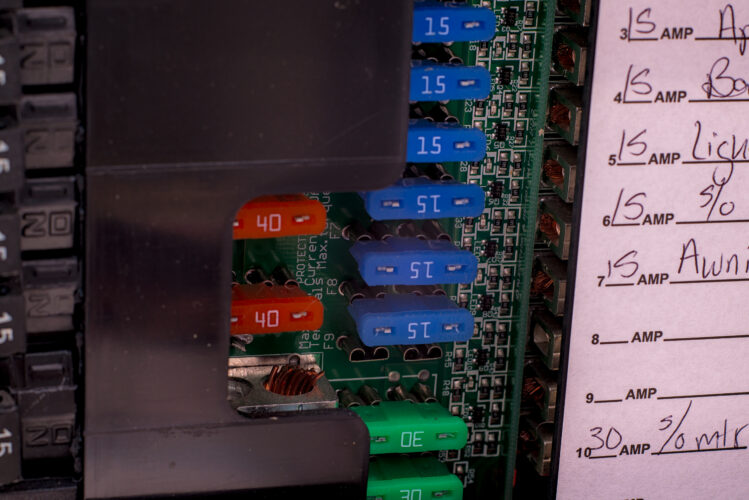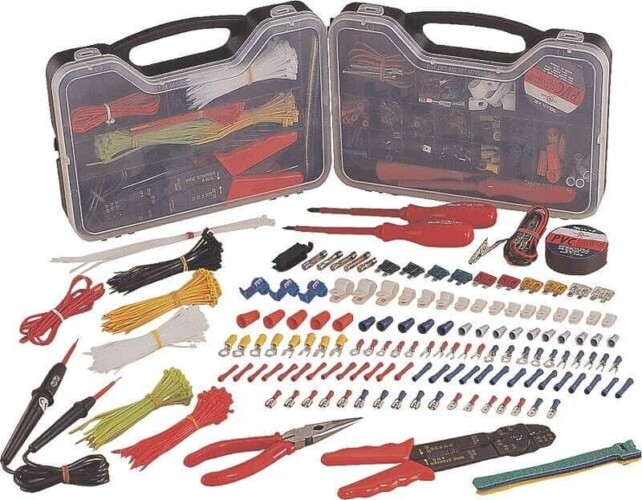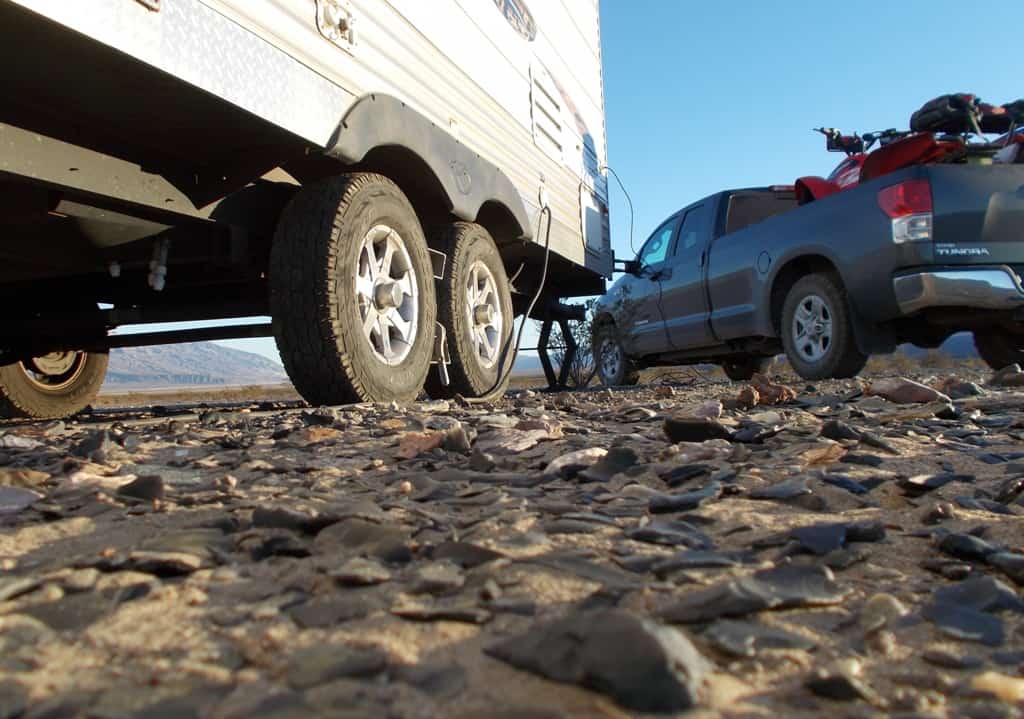Do you need to troubleshoot RV electricity? It’s easy to make a DIY 12-volt DC test kit that helps you do that. Read on to find out how.
Do More Boondocking with Your RV’s 12-Volt DC Power Supply
Those that follow my ramblings through the years know my preferred campsite is dry camping out in the boondocks away from others.

One great thing about dry camping is my RV allows me to enjoy all the creature comforts of home without the need for shore power (120-volt electrical outlet). My RV is equipped with an absorption refrigerator that requires minimal 12-volt DC power. Most RVers can boondock too with just the 12-volts supplied by their RV house batteries.
In fact, most RV dry campers could lose their entire 120-volt system in their RV and survive with little inconvenience. Especially, if they carry these useful items for dry camping without power.
On the other hand, if you lose your RV’s 12-volt DC power system, you are giving up your scenic campsite in the boonies for a distant RV repair shop.
What RV Systems are Powered by 12-volt DC Power?
RVs use 12-volt DC power for many things, such as:
- Ceiling lights
- TV / Radio
- Water pump
- Furnace fan
- Exhaust fans
- and electronics that keep the refrigerator and water heater operating
Yes, 12-volt DC power is one of the most important systems in your RV. It is also one of the more likely systems to need minor repairs from time to time. Fortunately, it is also the most field repairable in terms of parts, diagnostics, tools, and repair time.
If you carry a 12-volt DC test kit to troubleshoot RV electricity, and possess basic knowledge of the 12-volt power system, there’s no need to abandon your campsite when power problems happen. Just fix the issue, relax and continue enjoying your adventure.

Make a DIY 12-volt DC Test Kit to Troubleshoot RV Electricity
Every RV needs a 12-volt DC test kit. You can buy an electrical repair kit, or take a DIY approach to make one very inexpensively. Just assemble the following electricity troubleshooting items:
Must-Have 12-volt DC Tools Include:
Volt ohm meter: An inexpensive unit is sufficient for basic 12-volt diagnosis. In most cases, you will use it to check for voltage, polarity, and continuity. A volt ohm meter can also be used to diagnose 120-volt shore power problems.
12-volt test light: While a volt ohm meter can verify whether 12-volts is present on a circuit, a 12-volt test light allows you to put a small load on the circuit to verify you are not dealing with surface voltage or a bad ground. The 12-volt test light also allows you to check for voltage without opening a covered connection. Just use the point of the 12-volt tester to “stab” into the wire, piercing the insulation and contacting the conductive portion.
Wire cutters: A small pair allows you to cut out damaged wires, remove bad connectors, cut new wires to length, or form a jumper.
Wire stripper / crimper: A wire stripper allows you to strip insulation when you need to expose fresh copper on a corroded wire. This is done to prepare the wire to accept a crimp connector. The crimper enables you to crimp new butt connectors and ring terminals onto the wires.
Test leads with alligator clips: While not essential for your kit, test leads can come in handy while diagnosing 12-volt problems. They can free up your hands from holding a volt ohm meter or test light while you perform other tasks. You can also use them to jump a low voltage switch while you check to see if power is restored downline from the switch. A set like this is perfect to test 12-volt DC power in RVs.

Essential 12-volt DC Parts / Supplies for Repairs Include:
- Replacement fuses: Carry an assortment of the correct type of RV fuses, along with a variety of amperage ratings, utilized by your RV. You want to have fuses on hand that fit the power distribution panel in your RV. And you also need fuses for exterior circuits like house batteries, marker lights, turn signals, etc. Other 12-volt items that may incorporate a fuse include the LP gas detector, stereo, power jacks and any aftermarket installed items requiring 12-volts. Towable RV owners should also carry spare fuses for the tow vehicle.
- Crimp connectors assortment: Crimp connectors are used to connect wires carrying 12-volts in and around your RV. Types include butt connectors used to connect two wires together, spade connectors used to connect wires to 12-volt switches and ring terminals used on battery leads and other higher current connections utilizing a stud connection. The most common RV crimp connector sizes are 14-16 gauge (blue) and 10-12 gauge (yellow). I also carry tap connectors, commonly known by the brand name Scotch locks, for quick repairs and jumping of wires. RVers either love them or hate them so the decision to place them in your DIY 12-volt DC test kit is yours.
- Electrical tape: A roll of electrical tape is sufficient to wrap exposed sections of uninsulated wire for field repairs. If you want to get fancy, include an assortment of heat shrink tubing to cover repaired 12-volt connections.
- A few short lengths of 14-gauge wire. When you need to replace a section of a circuit or lengthen a wire to reach its destination, having a few short lengths of wire with you can save your trip. Since 14-gauge is common in many RV circuits, this is a good size to carry in your DIY 12-volt DC test kit. If needed, a wire can be doubled / tripled up to temporarily carry a heavier load until a wire of the correct gauge can be installed as a permanent repair. Remember to use stranded automotive wire for 12-volt circuits.
Learn to Use a 12-volt DC Test Kit to Troubleshoot RV Power
Don’t be afraid of tackling RV power problems. Most 12-volt RV power supply repairs are easier than you think. To troubleshoot 12-volt electricity issues, you only need some basic low voltage electrical knowledge and confidence. One way to get that knowledge is to camp with a friend who is also a seasoned RV owner. Ask them to share their 12-volt RV troubleshooting expertise and repair experiences.
Plenty of other sources to obtain 12-volt know how include seminars at RV shows, RV maintenance and repair tutorials and books, YouTube videos and the iRV2 discussion forums community.
Many RV power problems are easy to solve.
Troubleshooting issues such as open circuits in the form of blown fuses or loose connections is just one example of an easy DIY repair. As a bonus, under normal circumstances 12-volt RV power will not deliver a shock, and is highly unlikely to harm your body in the same way that shore power can.
Get the basics to diagnose and repair a 12-volt RV power problem on the road. It’s one of the best ways to enjoy stress-free RV travel. If you don’t already have a 12-volt DC test kit to troubleshoot RV power, assemble one today!




